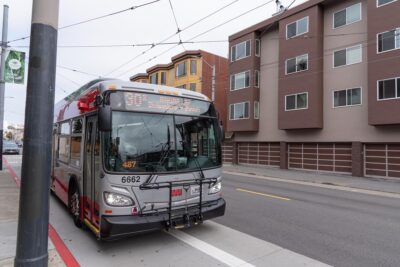Misguided Data Center Regulations Would Pull the Plug on California Digital Competitiveness, Hurt Businesses and Consumers
Legislation (Bauer Kahan, AB 222) that would require the collection and reporting of energy being used by artificial intelligence (AI) models and the data centers that power them appears at first blush to be a rational approach to a rapidly evolving sector of our economy and society. But peer deeper and the threat the legislation poses to California’s tech industry and economic competitiveness becomes clear and is why the Bay Area Council is actively working to defeat AB 222.
Currently data centers use roughly 4% of the electricity consumed in the United States, and that number is projected to grow in the coming years to accommodate our ever-evolving digital lives. Among many other things, data centers allow us to shop from home, learn online, have a doctor’s appointment without driving to an office and, of course, take Zoom calls in our pajamas on Fridays! This infrastructure is every bit as critical to how we live our 21st century lives as our reservoirs, our freeways and transit systems and our electrical grid.
So why are we concerned about AB 222? What is so wrong about data discloser and collection? Well for starters, the level of detail on how much energy is being used and for what purpose could require the developers of AI models to disclose proprietary information that could compromise their competitiveness. Assemblymember Bauer Kahan did recognize this risk and we appreciate that she amended the bill today to allow for the reporting of aggregated data, but we are not 100% convinced that this solves the problem.
Our principal concerns, however, are that we do not believe that any industry sector should be singled out for elevated scrutiny in this way. Of course we need to track and monitor energy use for forward planning, but does Michigan audit the auto industry’s energy use? Does Florida audit the energy demands of tourism? No! So why is California attempting to place these additional requirements on our most promising growth industry?
Finally, we believe that the principal reason for pushing this effort comes from a fundamental misunderstanding of how California’s energy grid works. Proponents have expressed concern that growth in the data center and AI industries will place additional demands on our grid that will drive up prices for consumers. This could not be further from the truth. As our utilities continue to invest billions of dollars in upgrading California’s energy generation, transmission and distribution systems to make them cleaner, greener and more fire safe, a portion of those costs are added to every utility bill, so the more users there are, particularly large users, the less each consumer will have to pay.
We look forward to working with Assemblymember Bauer Kahan to find the right way to project future energy needs and keep our grid safe and secure while allowing this critical part of our economy to grow, but AB 222 is not the way to do it. To engage in our business climate and technology policy work, please contact Senior Vice President Matt Regan.






